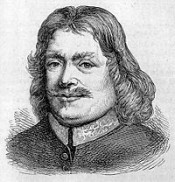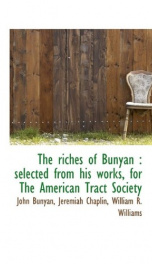Bunyan John

John Bunyan (28 November 1628 – 31 August 1688) was an English Christian writer and preacher, famous for writing The Pilgrim's Progress. In the Church of England, he is remembered with a Lesser Festival on 30 August. Bunyan was born in Harrowden (one mile southeast of Bedford), in the Parish of Elstow, England. He was baptized John Bunyan, on November 30, 1628 as recorded in the Elstow parish register. The family has a long history in England and the name has been found spelled over thirty-four different ways: Binyan, Buniun, Bonyon, Buignon, being the most common and Bunyan being the least, historically. Parish records show that William Boynon, a supposed ancestor of John Bunyan, was living in the hamlet of Harrowden in 1327, and the area has been known as "Farther Bunyan's", "Bunyan's Walk" and "Bunyan's End" from at least the sixteenth century. John Bunyan was born to Thomas Bunyan and Margaret Bently; he was also from Elstow and she, like her husband, was born in 1603. They married on May 27, 1627 and in 1628 Margaret's sister, Rose Bently, married Thomas' half-brother Edward Bunyan. (Thomas had married his first wife in 1623 and like his father before him, would marry two more times within months of being widowed.) They were working-class people with Thomas earning a living as a tinker or brazier; one who mends kettles and pots. Bunyan wrote of his modest origins, "My descent was of a low and inconsiderable generation, my father's house being of that rank that is meanest and most despised of all the families of the land". He had very little schooling (about 2–4 years). He was educated at his father's house with other poor country boys and what little education he received was to benefit his father and his own future trade. He followed his father in the Tarish Tinker's trade, which at the time had a reputation as being a lowly sort of occupation and was associated historically with the nomadic lifestyle of gypsies. In 1644, at the age of sixteen, Bunyan lost his mother and two sisters, all who died within months of each other; and his father married for the third time. It may have been the arrival of his stepmother that precipitated his estrangement and subsequent enlistment in the parliamentary army. He served in the parliamentary army at Newport Pagnell garrison (1644-1647) as the civil war was nearing the end of the first stage. He was saved from death by a fellow soldier who volunteered to go into battle in his place and was killed while walking sentry duty[1]. After the civil war was won by The Parliamentarians, Bunyan returned to his former trade and eventually found a wife. In 1649 (when he was about 21), he married a young woman, Mary, whose only dowry appears to have been two books, Arthur Dent's Plain Man's Pathway to Heaven and Lewis Bayly's Practice of Piety, by which he was influenced towards a religious life. She was an orphan, her father leaving only those two books as her inheritance, and their life was modest to say the least. Bunyan writes that they were "as poor as poor might be", not even "a dish or spoon between them". In his autobiographical book, Grace Abounding, Bunyan describes himself as having led an abandoned life in his youth, and as having been morally reprehensible as a result. However, there appears to be no evidence that he was outwardly worse than the average of his neighbours. Examples of sins to which he confesses in Grace Abounding are profanity, dancing and bell-ringing. The increasing awareness of his un-Biblical life led him to contemplate acts of impiety and profanity; in particular, he was harassed by a curiosity in regard to the "unpardonable sin," and a prepossession that he had already committed it. He was known as an adept linguist as far as profanity was concerned, even the most proficient swearers were known to remark that Bunyan was "the ungodliest fellow for swearing they ever heard". While playing a game, "cat", in the village square, Bunyan claimed to have heard a voice that asked: "Wilt thou leave thy sins and go to heaven or have thy sins and go to hell?" He believed it was the voice of God chastising his indulgent ways, as Puritans held sacred the Sabbath day and permitted no sport. His spirituality was born from this experience and he struggled both with his sense of guilt and self-doubt and his belief in the Bible's promise of Christian damnation and salvation. As he struggled with his newfound faith, Bunyan became increasingly despondent and fell into mental as well as physical turmoil. During this time of conflict, Bunyan began a four year long discussion and spiritual journey with a few poor women of Bedford who belonged to a nonconformist sect which worshiped in St. John's Church. He increasingly identified himself with St. Paul, who had characterized himself as "the chief of sinners", and believed he was one of the spiritual elite, chosen by God. As a result of these experiences, he was received into the Congregational church in Bedford in 1653. On joining the Bedford Church, he began to follow the teachings of it's Pastor, John Gifford. While it is commonly asserted by modern Baptists that John Bunyan was one of them, and was re-baptized (dipped) as an adult, there is no original historical record of the event or of either Gifford or Bunyan re-baptizing anyone in the church records or in Bunyan's own extensive and well known writings. John Bunyan was open to all who had biblical faith in Jesus Christ, and was opposed to those who caused divisions over the form and time of baptism. The first recorded assertion that Bunyan was a Baptist appears to come much later as repeated by a Dr. Armitage in 1887 from an anonymous source supposedly around 1690, after John's death. There remain church records of the infant baptisms of John himself in 1628, and of his infant children: Mary in 1650, Elizabeth in 1654, and Joseph in 1672. Bunyan again claimed to have heard voices and have visions similar to St. Theresa's and William Blake's religious experiences. While still in Elstow, Mary gave birth to a blind daughter, also named Mary, and a second daughter, Elizabeth, shortly followed by two more children, John and Thomas. In 1655, after moving his family to Bedford, both Bunyan's wife and his mentor, John Gifford, died. He was immersed in grief and his health declined, though the same year he became a deacon of St. Paul's Church, Bedford and began preaching, with marked success from the start. Bunyan fiercely disagreed with the teachings of the Quakers and took part in written debates during the years 1656-1657 with some of its leaders. First, Bunyan published Some Gospel Truths Opened in which he attacked Quaker beliefs. The Quaker Edward Burrough responded with The True Faith of the Gospel of Peace. Bunyan countered Burrough's pamphlet with A Vindication of Some Gospel Truths Opened, which Burrough answered with Truth (the Strongest of All) Witnessed Forth. Later, the Quaker leader George Fox entered the verbal fray by publishing a refutation of Bunyan's essay in his The Great Mystery of the Great Whore Unfolded. The Bedford Congregationalists were moderate in their views; they were considered more liberal on issues of church government than the Presbyterians and more conservative on church tenets than supposed antinomian sects, such as the Quakers. He attacked the Quakers for their reliance on their own "inner light" rather than the literal word of the Bible. The Puritans were diligent biographers of their own lives in relation to their faith and they sought clues religious meaning in their lives and literature. Bunyan writes to his readers in the conclusion of the first part of The Pilgrim's Progress: His affinity for the oral tradition and his voracious reading lead to his work being primarily influenced by sermons, homilies in dialog form, folk tales, books of emblems and allegories. "Most of the didactic works of Bunyan's era have vanished into oblivion. His allegory's power derives from the imaginative force with which he brings didactic themes to life and the wonderfully living prose in which he dramatizes the conflicts of the spirit". Baptist Associations and Conventions Baptist Portal As his popularity and notoriety grew, Bunyan increasingly became a target for slander and libel; he was decried as "a witch, a Jesuit, a highwayman" and was said to have mistresses and multiple wives. In 1658, aged 30, he was arrested for preaching at Eaton Socon and in 1658, Bunyan was indicted for preaching without a license. He continued, however, and did not suffer imprisonment till November 1660, when he was taken to the county gaol in Silver Street, Bedford. Bunyan married his second wife, Elizabeth, by whom he had two more children, Sarah and Joseph. In that same year, The Restoration of the monarchy by Charles II of England began Bunyan's persecution as the country returned to Anglicanism. Meeting-houses were quickly closed and all citizens were required to attend their Anglican parish church. It became punishable by law to "conduct divine service except in accordance with the ritual of the church, or for one not in Episcopal orders to address a congregation." He no longer had the freedom to preach that he had enjoyed under the Puritan Commonwealth and he was arrested on November 12, 1660 while preaching privately in Lower Samsell by Harlington, Bedfordshire, south of Bedford. There he was confined at first for three months, but on his refusing to conform or to desist from preaching, his confinement was extended for a period of nearly 12 years (with the exception of a few weeks in 1666). His prosecutor, Mr. Justice Wingate, was not inclined to incarcerate Bunyan, but his stark refusal of "If you release me today, I will preach tomorrow" left Wingate with no choice. In January of 1661 he was incarcerated for the crimes of "pertinaciously abstaining" from attending mandatory Anglican church services and preaching at "unlawful meetings". It was during this time that he conceived his allegorical novel: The Pilgrim's Progress. (Many scholars however believe that he commenced this work during the second and shorter imprisonment of 1675 referred to below.) Bunyan's wife, Elizabeth, tried in vain to secure her husband's release, but his steadfast opposition to the laws and his determination to preach to his awaiting congregation prevented his liberation. His incarceration was punctuated with periods of relative freedom by which lax gaolers allowed Bunyan to attend church meetings and minister to his congregation.
do you like this author?
What readers are saying
What do you think? Write your own comment on this book!
write a commentWhat readers are saying
What do you think? Write your own comment on this author!
write a commentBook list

The Heavenly Footman
or,A description of the man that gets to heaven: with directions how to run so as to obtain
Series:
Unknown
Year:
Unknown
Raiting:
4/5
Show more
add to favoritesadd In favorites
Book list

The Heavenly Footman
or,A description of the man that gets to heaven: with directions how to run so as to obtain
Series:
Unknown
Year:
Unknown
Raiting:
4/5
Show more
add to favoritesadd In favorites

The Riches of Bunyan
Series:
Unknown
Year:
Unknown
Raiting:
4/5
A work, devoted to an English Christian writer and preacher of the 17th century John Bunyan is full of sense of the joy and love of God. One who knew this puritan theologist well wrote, “The grace of God was magnified in him and by him, and a rich anointing of the Spirit was upon him.” Active as pastor, writer, helper, counselor, organizer, administrator, and pastor-in-chief to a multitude of churches, he is regarded by right as a literary genius nowadays. This book is a peculiar collection of Bunyan’s teachings and wisdom obtained from his fundamental works.
Show more
add to favoritesadd In favorites

The Pilgrim's Progress from this world to that which is to come, delivered under the similitude of a dream, by John Bunyan
Series:
Unknown
Year:
Unknown
Raiting:
2/5
The world famous work of John Bunyan, an English Christian writer and preacher of the seventeenth century. For his propagation of the Gospel he spent more that twenty years in prison, creating his book, which res se appear the story of his life. Allegorically the author describes the way to salvation, during which the hero, a Christian, passes through numerous obstacles, and meets numerous personages: Obstinate, Pliable, each trying to find the way to God. All these represent the spiritual struggle between Christ and Satan for the human soul, as well as the inner struggle of a man. Neither before, nor after the appearance of “The Pilgrim's Progress” there was a work of such significance. This allegory is inimitable; the depth of thought, written out characters and their acts, the knowledge and understanding of scripture make the book one of the most remarkable pieces of the world literature of the seventeenth century.
In 1638 Bunyan published the second part of The Pilgrim's Progress”, where he described wandering of the Christian’s wife and children. The author intended to create the third part about the life of the hero’s children after his death, but admittedly this writing has never been written or lost. This is the unique work concerning the human searching of God, the doubts, confession and spiritual growth and numerous obstacles to it. The events revealed through the dreams of the hero, what allows portraying, vividly and captivatingly, the processes in the soul and the inner world, unseen to human eyes.
Show more
add to favoritesadd In favorites
In 1638 Bunyan published the second part of The Pilgrim's Progress”, where he described wandering of the Christian’s wife and children. The author intended to create the third part about the life of the hero’s children after his death, but admittedly this writing has never been written or lost. This is the unique work concerning the human searching of God, the doubts, confession and spiritual growth and numerous obstacles to it. The events revealed through the dreams of the hero, what allows portraying, vividly and captivatingly, the processes in the soul and the inner world, unseen to human eyes.
Show more

Miscellaneous Pieces
Series:
Unknown
Year:
Unknown
Raiting:
5/5
Webster's edition of this classic is organized to expose the reader to a maximum number of synonyms and antonyms for difficult and often ambiguous English words that are encountered in other works of literature, conversation, or academic examinations. Extremely rare or idiosyncratic words and expressions are given lower priority in the notes compared to words which are ¿difficult, and often encountered¿ in examinations. Rather than supply a single synonym, many are provided for a variety of meanings, allowing readers to better grasp the ambiguity of the English language, and avoid using the notes as a pure crutch. Having the reader decipher a word's meaning within context serves to improve vocabulary retention and understanding. Each page covers words not already highlighted on previous pages. If a difficult word is not noted on a page, chances are that it has been highlighted on a previous page. A more complete thesaurus is supplied at the end of the book; synonyms and antonyms are extracted from Webster's Online Dictionary. PSAT¿ is a registered trademark of the College Entrance Examination Board and the National Merit Scholarship Corporation neither of which sponsors or endorses this book; SAT¿ is a registered trademark of the College Board which neither sponsors nor endorses this book; GRE¿, AP¿ and Advanced Placement¿ are registered trademarks of the Educational Testing Service which neither sponsors nor endorses this book, GMAT¿ is a registered trademark of the Graduate Management Admissions Council which is neither affiliated with this book nor endorses this book, LSAT¿ is a registered trademark of the Law School Admissions Council which neither sponsors nor endorses this product. All rights reserved.
Show more
add to favoritesadd In favorites

The Jerusalem Sinner Saved; or, Good News for the Vilest of Men
Series:
Unknown
Year:
Unknown
Raiting:
4.5/5
The Jerusalem Sinner Saved is a book written by John Bunyan. It is widely considered to be one of the top 100 greatest books of all time. This great novel will surely attract a whole new generation of readers. For many, The Jerusalem Sinner Saved is required reading for various courses and curriculums. And for others who simply enjoy reading timeless pieces of classic literature, this gem by John Bunyan is highly recommended. Published by Quill Pen Classics and beautifully produced, The Jerusalem Sinner Saved would make an ideal gift and it should be a part of everyone's personal library. --This text refers to an out of print or unavailable edition of this title.
Show more
add to favoritesadd In favorites

The Holy war, made by King Shaddai upon Diabolus, for the regaining of the metropolis of the world; or, the losing and taking again of the town of Mansoul
Series:
Unknown
Year:
Unknown
Raiting:
3/5
The Holy war, made by King Shaddai upon Diabolus, for the regaining of the metropolis of the world; or, the losing and taking again of the town of Mansoul. please visit www.valdebooks.com for a full list of titles
Show more
add to favoritesadd In favorites

An Exhortation to Peace and Unity
Series:
Unknown
Year:
Unknown
Raiting:
4/5
An Exhortation to Peace and Unity is a book written by John Bunyan. It is widely considered to be one of the top 100 greatest books of all time. This great novel will surely attract a whole new generation of readers. For many, An Exhortation to Peace and Unity is required reading for various courses and curriculums. And for others who simply enjoy reading timeless pieces of classic literature, this gem by John Bunyan is highly recommended. Published by Quill Pen Classics and beautifully produced, An Exhortation to Peace and Unity would make an ideal gift and it should be a part of everyone's personal library.
Show more
add to favoritesadd In favorites
What readers are saying
What do you think? Write your own comment on this author!
write a commentif you like Bunyan John try:
readers also enjoyed
What readers are saying
What do you think? Write your own comment on this author!
write a commentGenre
if you like Bunyan John try:
readers also enjoyed
Do you want to exchange books? It’s EASY!
Get registered and find other users who want to give their favourite books to good hands!

